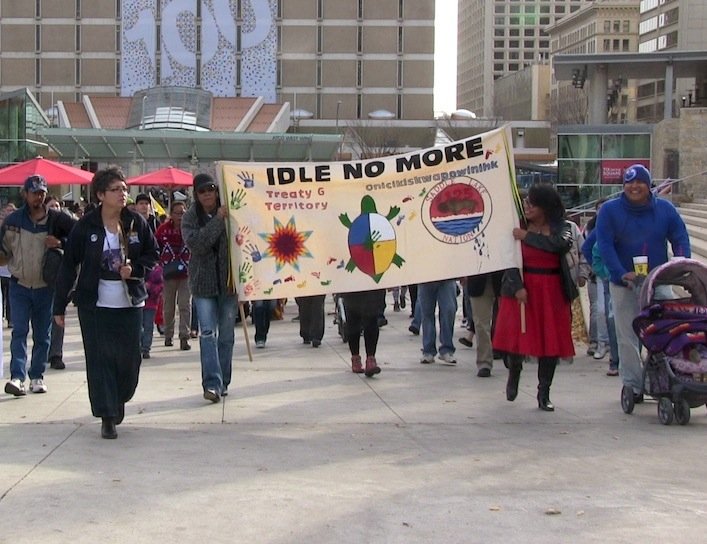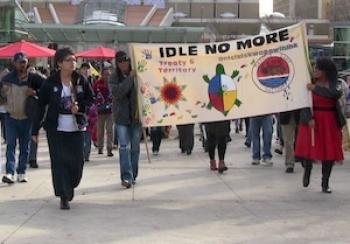Image Caption
Summary
By Shari Narine
Sweetgrass Contributing Editor
SADDLE LAKE CREE NATION
June 14, 2016.

Shannon Houle, a name synonymous in Alberta with the Idle No More movement, will not be running for a second term as councillor for the Saddle Lake Cree Nation – despite filing her nomination paper for the June 1 deadline.
“I’ve been given no explanation why I can’t run,” said Houle. “I feel as if I’m being targeted.”
The election is scheduled for June 15.
All other seven councillors and Chief Leonard Jackson successfully filed their nomination papers.
Houle is one of 10 people, who had their nominations rejected by what she calls an “unofficial appeal committee.” Members volunteered to sit on the appeal committee and were not appointed by council. Houle says she had to find out through other channels that her nomination had been rejected. She also noted that she has been unable to reach electoral officer Ron Lameman to express her concerns or to get his ruling.
Houle can’t understand why her nomination has been rejected, because if the basis is the custom election process used by Saddle Lake Cree Nation then Houle’s nomination three years ago shouldn’t have stood either.
According to the custom election, those who serve on council must reside on the First Nation and not be involved in a common-law relationship.
Houle has two family residences on the Saddle Lake Cree Nation – although one has been condemned in the past year and a half – and she has had the same common-law partner for the past 17 years. They were joined in ceremony by an Elder.
In 2013, five complaints were filed against Houle’s nomination. She pleaded her case to the electoral officer and her nomination was allowed. She was elected.
According to Dr. James Makokis that set a precedent and there was no reason to believe that Houle could not run for a second term.
But more than that, he says, the custom election followed by the First Nation is antiquated and needs to change.
“They’re not our nehiyaw wiyasiwewina, which is our own Cree laws. They’re actually Indian Act policies that our people were forced to create under duress at that time. So some of those that exist are very discriminatory,” said Makokis.
He points to the fact that 50 per cent of First Nations members live off reserve, a necessity for a number of reasons, including lack of adequate housing on the reserve and the desire to pursue higher education. Members who live off reserve can vote.
Makokis has joined Houle, as well as three other people, whose nominations were rejected – Greg Cardinal, Louise Large, and Valerie Steinhauer – in organizing a peaceful protest on Wednesday.
“Our immediate goal is to be reinstated. That way we have a choice and opportunity and the people have a choice and opportunity to vote,” said Houle. “We want this issue finally addressed and dealt with and no longer waiting for the hope of another council…. We’ve been doing this for too long.”
However, changing the custom election will not be an easy feat. Agreement on changes has to come from members from both the Saddle Lake Cree Nation and the Whitefish Lake Nation, which each have their own land base. At one point, the two First Nations were together, but in the 1970s two Chiefs were elected and two councils created. But as they are recognized as one Nation under the Indian Act, they must have joint council meetings and issues such as elections, land-base and membership, must be jointly decided.
Houle says working on the custom election had been on her agenda during this past term, but Whitefish Lake First Nation’s attention was focused on court action to separate from Saddle Lake Cree Nation. It was unsuccessful.
Makokis sees changing the custom election as a vital step to the First Nation’s survival.
“As a concerned physician, who’s worked in our nations from 2013 to 2015, seeing the conditions that our people live in and are suffering through, I am worried about the health of our people, the prosperity of our people, the well-being of our people, if well-informed, qualified candidates, and our own relations, are continued to be excluded from participating in what is supposed to be a democratic process,” he said.
Restoring Harmony in Our Nation, as Houle and Makokis’s group is called, is about bringing back Cree ways and bring attention to procedural irregularities in the present custom election system.
The demonstration walk will begin at 8 a.m. starting from the Bison Auto Gas Station and ending at the Ayiwakes Hall, where voters are marking their ballots.

